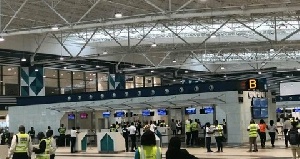- Home - News
- TWI News | TV
- Polls
- Year In Review
- News Archive
- Crime & Punishment
- Politics
- Regional
- Editorial
- Health
- Ghanaians Abroad
- Tabloid
- Africa
- Religion
- Election 2020
- Coronavirus
- News Videos | TV
- Photo Archives
- News Headlines
- Press Release
Opinions of Monday, 23 March 2020
Columnist: Rockson Adofo
Kotoka International Airport baggage check-in staff are practising big time corruption
The Ghanaian’s silly infatuation with bribery, extortion, and corruption never abates regardless of the circumstance.
Now that the world is almost on lockdown with businesses collapsing, airlines grounding their aircraft with owners ordering their staff to proceed home on compulsory unpaid leave, etc., a detestable scenario is unfolding at the Kotoka airport in Ghana.
The luggage check-in staff of some of the few airlines still allowed into the country despite the outbreak of the fatal coronavirus (Covid-19) pandemic, are engaged in active corruption to enrich themselves.
The following is how they do it. Some of the airlines, especially the British Airways, have come out with a policy similar to that of promotion sales to attract more passengers to patronise their aircrafts.
Apart from one's two normal check-in baggage of 23 kilos each, they have offered to allow their customers to carry two additional cabin-size, thus, accompanied baggage, of 23 kilograms each, onto the plane. However, the size of such luggage must be of the size measurement so specified to fit into the built-in metal specifications containers at the airport.
They continue to promise that should a customer (passenger) desire that one of their cabin-size baggage be checked into the cargo hold of the plane like their normal two 23 kilos baggage, the airline will do it for them free.
This promotion offer has very often been misunderstood by some passengers on Ghana or African routes. They think that as long as it is of the weight of 23 kilos same as the normal two allowances 23 kilos luggage, irrespective of the size of the luggage, as long as the weight does not exceed 23 kilos, they can either take it onto the plane as cabin-accompanied or ask for it to be checked into cargo hold without incurring any cost.
No! As long as the weight is within 23 kilos but the size of the luggage exceeds the specified size for cabin luggage, you will be asked to check it in as an excess suitcase at the cost of £140 a luggage, or you leave it behind at the airport with whoever is seeing you off to continue your journey without the luggage.
In Europe, USA, Canada etc., the passenger may pay for such luggage to be checked in for him or her rather than abandoning it at the airport to be taken home by their relatives or to be destroyed by the airport security.
No matter how you plead with the check-in staff, they will not do you any favours. You either pay, or you leave your luggage behind. And, when you pay, you will be issued with an official receipt, meaning the money is going directly into the airline's official bank account.
They don't accept cash payments but bank card (bank credit or debit card) payment.
Nevertheless, in Ghana, what these check-in staff are doing is to secretly accept the payment of the excess luggage into their pocket instead of into the accounts of the airlines'.
If a passenger is to pay say, £140, €170 or US$190 for one excess luggage, the official rate, they will strike a deal with the passenger to pay say £80, €120 or US$140. When the deal is struck when the passenger initiates it by pleas with the check-in staff to reduce it for him/her, the money in cash paid is not receipted. It goes straight into the pocket of the check-in staff.
This is what is currently going on at the Kotoka airport as I speak. The baggage check-in staff at the check-in desk are in collusion with the baggage handlers to executing this corrupt practice. They accept the negotiated money payment, bribe of course, away from the public view.
This has been reported to me on Friday, 20 March 2020, by a passenger who went through this malpractice at the hands of the luggage check-in staff at the Kotoka airport in Accra.
How many passengers are they doing this to, and how much illegally-earned money do they take home each day they do attend work?
Airlines are being grounded following the Covid-19 pandemic. Some airlines are folding up following the ongoing coronavirus disease. Some people are losing their jobs. Nonetheless, here are some people lucky to be employed but are compounding the woes of their employers by siphoning off the revenue that should go to the employer to keep the airline in operation.
Suggestions:
I advise the airlines offering such promotions to be clearer on their policy to remove the catch that throws unsuspecting passengers into the deep end of financial uncertainty. They should remove the indicated 23 kilos allowance for the two cabin-accompanied luggage which are similar in weight to the normal check-in two normal size baggage. They can change it to say 15 or 20 kilos to remove the confusion from the minds of passengers. This will alert them to use smaller-sized luggage able to be held in the cabin compartments in the aircrafts even if they are able to pack 23 kilo weight of items into it.
This will not trick passengers into believing that they can take along with them three same luggage of 23 kilos each without incurring any surprise excess luggage payments.
The airlines must have robust systems in place at their check-in counters, especially in Ghana, Africa or the corruption-infested countries to deter their luggage check-in staff from successfully engaging in such nefarious activities.
Those employees in the luggage check-in counters must please desist from their corrupt practices. Should they be mentioned, or be vividly described for them to get the sack, they will only go home to blame their poor grandparents sitting quietly at home waiting to die as witches doing them rather than blaming themselves for their greed.
Those into that practice are surely the breadwinners of their families so I shall spare them because of the coronavirus pandemic making life harder for everyone at the moment. Should they continue, they will end up being reported and getting the sack one day by a no-nonsense passenger.
Those travellers allowing themselves to be duped oftentimes do not have a choice. They end up spending all their money so when they get to the airport and are confronted with excess luggage payments, they become shocked and end up pleading to finally allow themselves to be swindled by the disgraceful, insatiably greedy and unprofessional luggage check-in staff at the Kotoka airport.
Conclusion:
Unless a big corrupt politician is arrested and dealt with, fighting corruption in Ghana at the level of the staff under discussion is very difficult. It is like attempting to kill a snake by hitting it on the tail.
Rockson Adofo











